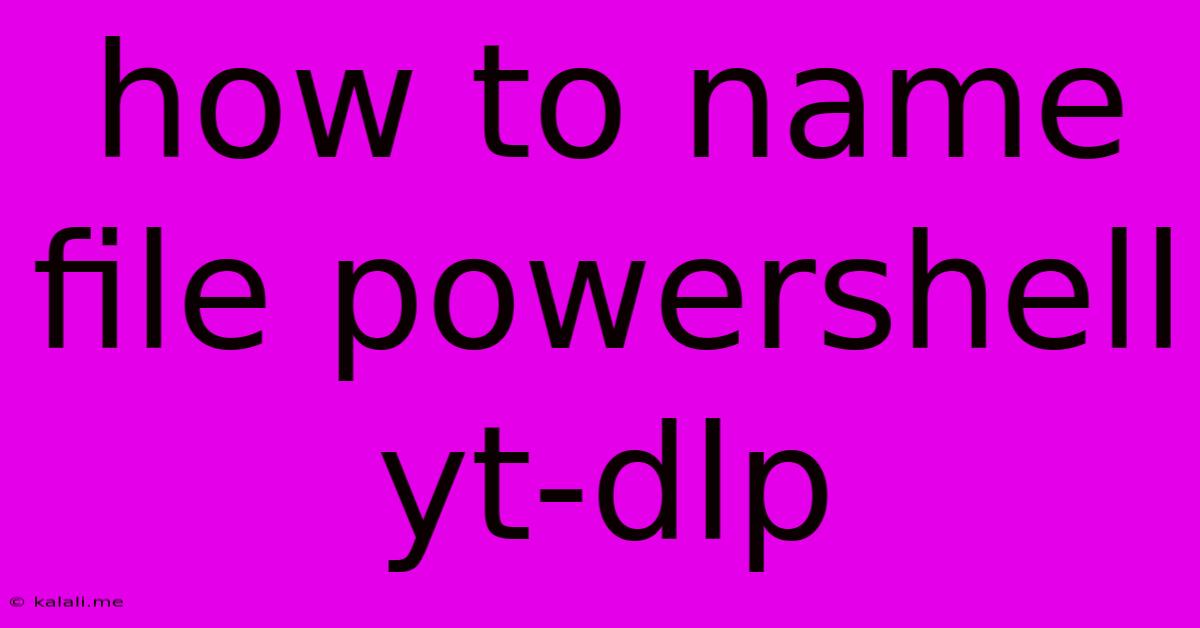How To Name File Powershell Yt-dlp
Kalali
Jun 07, 2025 · 3 min read

Table of Contents
How to Name Files in PowerShell using yt-dlp: A Comprehensive Guide
This guide provides a comprehensive walkthrough on how to effectively manage file naming conventions when downloading videos using yt-dlp within PowerShell. Proper file naming is crucial for organization and efficient media management. We'll cover various methods, from simple renaming to leveraging PowerShell's powerful features for custom naming schemes. This will ensure your downloaded videos are easily identifiable and searchable.
Why Proper File Naming Matters
Before diving into the specifics, let's understand why consistent file naming is vital:
- Organization: A well-defined naming convention keeps your video library neat and easily browsable. Imagine trying to find a specific video amongst hundreds of files with random names!
- Search and Retrieval: Descriptive filenames make it much easier to find videos using your operating system's search functionality.
- Automation: Consistent naming allows for easier automation of tasks like sorting, tagging, and transferring files.
Basic File Naming with yt-dlp's Built-in Options
yt-dlp offers some basic options for controlling the output filename. These options are specified as command-line arguments. Here are a few examples:
-
-o "%(title)s-%(id)s.%(ext)s": This is a commonly used format. It uses the video's title (%(title)s), its unique ID (%(id)s), and the file extension (%(ext)s). This results in filenames like "AmazingVideo-abcdef1234.mp4". -
-o "%(uploader)s - %(title)s.%(ext)s": This option adds the uploader's name to the filename, which can be beneficial for identifying the source of the video.
Advanced File Naming with PowerShell
PowerShell significantly extends your file naming capabilities. We can combine yt-dlp's download functionality with PowerShell's robust string manipulation and file system commands.
Method 1: Renaming after Download
This method downloads videos using yt-dlp's default naming and then renames them using PowerShell afterwards.
-
Download the video: Use your preferred yt-dlp command to download the video. For simplicity, let's assume it downloads to the current directory.
-
Rename using PowerShell: After the download is complete, you can use PowerShell to rename the file. Here's an example:
$originalFileName = "YourOriginalFileName.mp4" # Replace with the actual filename $newFileName = "MyCustomName.mp4" Rename-Item -Path $originalFileName -NewName $newFileNameThis renames
YourOriginalFileName.mp4toMyCustomName.mp4.
Method 2: Using PowerShell to Process yt-dlp Output
This method is more sophisticated. We'll use PowerShell to capture yt-dlp's output and use that information to create custom filenames. This approach requires a more advanced understanding of PowerShell.
This example leverages -o and -x flags for better control:
yt-dlp -x --audio-format mp3 -o "%(id)s.%(ext)s" "https://www.youtube.com/watch?v=your_video_id" |
ForEach-Object {
if ($_ -match "Destination: (.*)") {
$filePath = $matches[1]
$newFileName = ($_.Title -replace '[\\/*?:"<>|]','_') + ".mp3"
Rename-Item -Path $filePath -NewName $newFileName
}
}
This command first downloads the audio in mp3 format using yt-dlp, then parses the output to extract the downloaded file path and title. It then cleans the title by replacing invalid characters with underscores and adds ".mp3" extension to create a new filename.
Tips and Best Practices
- Use descriptive filenames: Include keywords that accurately reflect the video's content.
- Avoid special characters: Stick to alphanumeric characters and hyphens to prevent compatibility issues.
- Maintain consistency: Develop a clear naming convention and stick to it.
- Use date formats (optional): Consider including the download date in the filename (e.g., YYYYMMDD).
- Test your scripts thoroughly: Before applying them to a large number of videos, test your PowerShell scripts on a smaller subset.
By following these guidelines and experimenting with the provided examples, you can effectively manage your downloaded videos and maintain a well-organized media library. Remember to adapt these techniques to your specific needs and preferences for optimal results.
Latest Posts
Latest Posts
-
Error Could Not Find Or Load Main Class User Jvm Args Txt
Jun 07, 2025
-
Walking Dead What Does Jss Mean
Jun 07, 2025
-
Light Fixtures Before And After Dim And Light
Jun 07, 2025
-
Can You Brine With Iodized Salt
Jun 07, 2025
-
How To Deposit A Business Check Into A Personal Account
Jun 07, 2025
Related Post
Thank you for visiting our website which covers about How To Name File Powershell Yt-dlp . We hope the information provided has been useful to you. Feel free to contact us if you have any questions or need further assistance. See you next time and don't miss to bookmark.